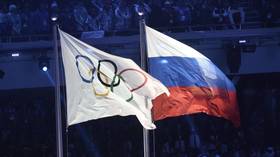No flag, no anthem: What the WADA ban means for Russia

The World Anti-Doping Agency (WADA) has banned Russia from major sporting events for four years, but what does the ban mean in practice for Russian athletes?
The WADA Executive Committee confirmed on Monday that Russia would be banned for a four-year period over alleged manipulations to Moscow laboratory data, prohibiting the country from hosting or competing at international sporting events for the suspension period.
However, the newly-introduced sanctions do not mean that Russian athletes will miss major competitions for four years as they will be able to compete as neutrals without the national flag and anthem, as was the case at the 2018 PyeongChang Winter Olympics.
Despite numerous calls to impose a blanket ban on all Russian athletes – including those who have never been implicated in doping scandals – WADA rejected the harshest measures, allowing clean competitors to perform on the international stage.
Also on rt.com Russia banned from major sporting events for 4 yearsAll of the Russian athletes who are planning to take part in next summer’s Olympics in Tokyo will need to be approved by WADA to be eligible to compete in Japan.
The 2020 UEFA European Championships, which will partly be hosted in Russia, will also reportedly not be affected by Monday’s WADA ruling, although the Russia team would have to compete as neutrals should they qualify for the FIFA 2022 World Cup in Qatar.
Hosting rights for major international events already granted to Russia before the ban will now be withdrawn, with the events being relocated to other countries.
Russia will also not be allowed to bid for the right to host the 2032 Olympic and Paralympic Games, even if the bidding process takes place during or after the four-year ban period.














